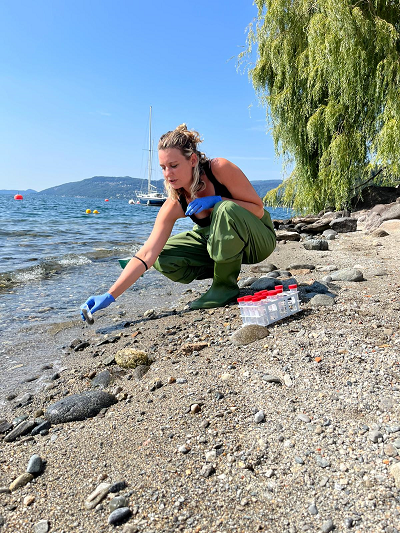
+39 0323 518321 (Telephone)
+39 0323 556513 (Fax)
How stable and flexible are microbiomes, how easily are they invaded by allochthonous bacteria?
Do small animals rather remove antibiotic resistant bacteria, or do they provide them with a surface to grow on and thereby persist?
Once such surfaces are inhabited by bacteria carrying antibiotic resistance genes can they be horizontally transferred to other bacteria?
Jul – Sep 2008, Research internship in microbial ecology, Under the supervision of Prof. Dr. Hans-Peter Grossart, Leibniz Institute for Freshwater Ecology and Inland Fishery Neuglobsow, Germany
Nov 2008 – Jan 2012, Master thesis in Biology (Microbiology) entitled: Dynamics and ecophysiology of bacteria during a phytoplankton spring bloom in Lake Zurich Under the supervision of Prof. Dr. Jakob Pernthaler, Limnological Station, Institute of Plant Biology University of Zurich, Zurich, Switzerland
Mar 2010 – Oct 2013, PhD studies in Natural Sciences (Biology, Microbiology) entitled: Organic carbon uptake by bacteria with different live strategies – Successions and unexplored food web interactions Under the supervision of Prof. Dr. Jakob Pernthaler, Limnological Station, Institute of Plant Biology University of Zurich, Switzerland
Mar 2014-Gen 2015, Post-doc position at the MEG of the CNR - Institute of Ecosystem Study Verbania in the research group of Dr. Gianluca Corno
Publications (just click here) 
Selected Publications:
Eckert, E. M., Galafassi, S., Navarro, M. B., Di Cesare, A., & Corno, G. (2023). Increased similarity of aquatic bacterial communities of different origin after antibiotic disturbance. Environmental Pollution, 316, 120568.
Di Cesare, A., Riva, F., Colinas, N., Borgomaneiro, G., Borin, S., Cabello-Yeves, P. J., ... & Eckert, E. M. (2022). Zooplankton as a transitional host for Escherichia coli in freshwater. Applied and Environmental Microbiology, 88(9), e02522-21.
Eckert EM, Di Cesare A, Fontaneto D, et al. (2020) Every fifth published metagenome is not available to science. PLoS Biology 18, e3000698.
Eckert EM, Quero GM, Di Cesare A, et al. (2019) Antibiotic disturbance affects aquatic microbial community composition and food web interactions but not community resilience. Molecular ecology 28, 1170-1182.
Eckert EM, Di Cesare A, Stenzel B, Fontaneto D, Corno G (2016) Daphnia as a refuge for an antibiotic resistance gene in an experimental freshwater community. Science of The Total Environment 571, 77-81.
Eckert EM, Di Cesare A, Coci M, Corno G (2018) Persistence of antibiotic resistance genes in large subalpine lakes: the role of anthropogenic pollution and ecological interactions. Hydrobiologia 824, 93-108.
Eckert EM, Pernthaler J (2014) Bacterial epibionts of Daphnia: a potential route for the transfer of dissolved organic carbon in freshwater food webs. ISME J 8, 1808-1819.